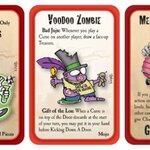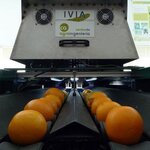Technology

Low power electronics and devices for active, modern lifestyles is getting edgy; the research is on for stuff that is wearable, epidermal, implantable - heck, even edible.
Smart skin, created by MC10, is an example of an 'epidermal electronic system. It contains micro-circuitry like transistors, sensors, transmitters and receivers that can get wrinkled, are bendable and stretchable, just like real skin, but retains damage-free function of all components.
Biomedical applications would allow wearers freedom of movement and eliminate adhesive tapes and wires attached to people. It works because…

How can you test for disaster without freaking out all your co-workers? Assume the best way to test for a disaster is to simulate it. Now factor in that a typical co-worker, if they overhead that a chlorine tanker overturned in DC or that terrorists are storming the building, will likely freak out. Is there a safe way to simulate an emergency?
Enter zombies. Often literally. It turns out that you can do good contingency operations exercises by seeing how people respond to a zombie infestation. Case in point, this year we're running a Contingency Operations…

Rotten oranges can be detected manually in dark rooms with the help of ultraviolet light that illuminates the essential oils in damaged rind through fluorescence but that type of light poses some risk on fruit quality, like a reduction in vitamin C.
Scientists at the Valencian Institute of Agrarian Research (IVIA, Spain) have created prototypes for machines that not only detect and automatically separate rotten oranges, but can also detect mandarin segments according to quality and helps citrus fruit pickers out in the field. All the prototypes use computer vision to automatically inspect the…

In Jewish and Christian tradition, Moses wrote the Torah, the first five books of the Bible. Recent evidence shows that multiple writers had a hand in composing the text of the Torah and the other books of the Hebrew Bible and of the New Testament are also thought to be composites. Researchers say they have developed an algorithm that could help to unravel the different sources that contributed to individual books of the Bible. Prof. Nachum Dershowitz of Tel Aviv University's Blavatnik School of Computer Science, who worked in collaboration with his son, Bible scholar Idan Dershowitz of…

Just supposing, what if you landed on a planet a lot like Earth and, bereft of modern technology, had to try and rebuild something that looks like home? You could survive, sure, a little trial and error would get you food and shelter. Creating fire can be a little more challenging but it is just a learning curve.
There are logistical aspects to rebuilding all of civilization, of course. One person can't build a skyscraper (and why would you, since there would be no one else to live in it?) but what about something small, like a toaster?
When I got The Toaster Project in the…

Who says mathematics papers can't be practical? Noah T. Jafferis, Howard A. Stone, and James C. Sturm of Princeton took a theoretical shot at a flying hoverboard and made it work - except it is a 4-inch conductive plastic sheet that “flies” using transverse traveling waves so don't get dreams of Marty McFly in "Back To The Future II" about it just yet, despite my title. A hoverboard using this current technology will need to be 50 feet wide to carry you.
Basically, they applied current to the plastic sheet and it created pockets of air underneath that moved from the front to the back,…

"Search. The final frontier. These are the voyages of the frustrated Web surfer. Its five-year mission: To explore strange new content, to seek out new ideas and new expressions. To boldly know when someone is pulling our leg or being sincere." I'm not waiting for William Shatner to record that monologue but there are days when I can almost hear it rolling about in my head. Search is such a universal thing for people -- we were born to it. We resonate with memories of failed searches every time we hear someone gasp, "What did I do with my keys?"…

We've all read about efforts to provide amputees with robotic limbs and we know that deep brain stimulation can relieve a range of Parkinson and OCD symptoms - a Tel Aviv University researcher has combined those ideas and gone a step farther and successfully implanted a robotic cerebellum into the skull of a rodent with brain damage, restoring its capacity for movement.
The cerebellum is responsible for co-ordinating movement, explains Prof. Matti Mintz of TAU's Department of Psychology. When wired to the brain, his "robo-cerebellum" receives, interprets, and transmits sensory…
It takes about 90 minutes to transmit a high-resolution image from Mars, but a new NASA optical communications system that NASA plans to demonstrate in 2016 will be so much faster it will even allow the streaming of high-definition video from distances beyond the Moon.
This dramatically enhanced transmission speed will be demonstrated by the Laser Communications Relay Demonstration (LCRD), one of three projects selected by NASA's Office of the Chief Technologist (OCT) for a trial run. To be developed by a team led by engineers at the NASA Goddard Space Flight Center in Greenbelt, Md.,…

A poll on Mashable, unscientific but a talking point anyway, found nearly 75-percent saying they "hate" the Facebook news feed changes.
But Mashable readers aside, how big a negative were the changes? To many, the previous changes had been worse so this was at least an improvement. And they added Rhapsody, Spotify and other music libraries with the Facebook timeline, which delighted the same Mashable people who disliked Facebook two days earlier.
UNTHINK.com has 'challenged' Facebook in a video manifesto:
It seems a little like someone on Blogspot 'challenging'…